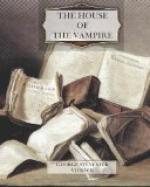GEORGE SYLVESTER VIERECK
Author of
Nineveh and Other Poems
New York
Moffat, Yard & Company
1912
Copyright, 1907, by
Moffat, Yard & Company
New York
Published September, 1907
Reprinted October, 1907
The Premier Press
New York
To My Mother
THE HOUSE
OF THE
VAMPIRE
I
The freakish little leader of the orchestra, newly imported from Sicily to New York, tossed his conductor’s wand excitedly through the air, drowning with musical thunders the hum of conversation and the clatter of plates.
Yet neither his apish demeanour nor the deafening noises that responded to every movement of his agile body detracted attention from the figure of Reginald Clarke and the young man at his side as they smilingly wound their way to the exit.
The boy’s expression was pleasant, with an inkling of wistfulness, while the soft glimmer of his lucid eyes betrayed the poet and the dreamer. The smile of Reginald Clarke was the smile of a conqueror. A suspicion of silver in his crown of dark hair only added dignity to his bearing, while the infinitely ramified lines above the heavy-set mouth spoke at once of subtlety and of strength. Without stretch of the imagination one might have likened him to a Roman cardinal of the days of the Borgias, who had miraculously stepped forth from the time-stained canvas and slipped into twentieth century evening-clothes.
With the affability of complete self-possession he nodded in response to greetings from all sides, inclining his head with special politeness to a young woman whose sea-blue eyes were riveted upon his features with a look of mingled hate and admiration.
The woman, disregarding his silent salutation, continued to stare at him wild-eyed, as a damned soul in purgatory might look at Satan passing in regal splendour through the seventy times sevenfold circles of hell.
Reginald Clarke walked on unconcernedly through the rows of gay diners, still smiling, affable, calm. But his companion bethought himself of certain rumours he had heard concerning Ethel Brandenbourg’s mad love for the man from whose features she could not even now turn her eyes. Evidently her passion was unreciprocated. It had not always been so. There was a time in her career, some years ago in Paris, when it was whispered that she had secretly married him and, not much later, obtained a divorce. The matter was never cleared up, as both preserved an uncompromising silence upon the subject of their matrimonial experience. Certain it was that, for a space, the genius of Reginald Clarke had completely dominated her brush, and that, ever since he had thrown her aside, her pictures were but plagiarisms of her former artistic self.




